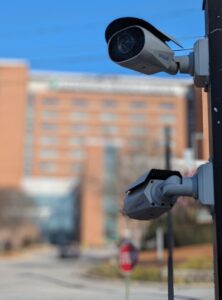License Plate Protections
Justin McClarrie, the Director of Public Safety for Lexington Medical Center (LMC), has been in the healthcare industry for over 15 years. He knows the importance of having the right tools for the job, particularly when it comes to safety, security, and emergency preparedness.

That’s why he and his public safety team at LMC have implemented an innovative license plate reader technology to prevent malicious actions on their campus.
Although workplace violence has been a concern in the healthcare industry for some time, the steady rise of occurrences has propelled it to the forefront of discussion. According to a 2019 Healthcare Crime Survey conducted by the International Association for Healthcare Security and Safety Foundation (IAHSSF), the assault rates against healthcare workers increased from 9.3 incidents per 100 beds in 2016 to 11.7 incidents per 100 beds in 2018. Additionally, U.S. Bureau of Labor and Statistics data shows that workplace violence incidents in healthcare have risen from 6.4 per 10,000 workers in 2011 to 10.4 per 10,000 workers in 2018. The unavoidable truth is that no healthcare system is immune to the perpetration of violence against their staff and, without comprehensive prevention strategies in place, the issue will only continue to grow.
Lexington Medical Center (LMC) began re-evaluating their physical security strategies over a decade ago and made the decision to implement a license plate reader system that would provide earlier detection of the risks that entered our campus. LMC was also able to integrate their system with the South Carolina Law Enforcement Division (SLED) National Crime Information Center, which can alert the team to stolen vehicles or any vehicle associated with wanted individuals. Additionally, they can create an internal “hot list” of license plates, which is utilized to input tags of interest such as domestic situations involving employees, potential criminal activity, vehicles of interest, etc.

“The utilization of the license plate reader system has proven extremely beneficial and is a routine part of our response to workplace violence incidents, trespass notices and criminal investigations,” says McClarrie, who is also a member of the International Association for Healthcare Security and Safety (IAHSS) and Certified Healthcare Protection Administrator (CHPA).
While the implementation of license plate readers could raise concerns about privacy, LMC took measures to ensure that the collected data was used solely for security and operational purposes. They also clearly communicate with patients, visitors, and staff about the purpose of LPRs and how the data will be handled is essential to build trust and ensure compliance with privacy expectations.
“The License Plate Reader system is an important part of LMC’s Violence Prevention program. The system allows our Public Safety team to proactively monitor any concerning individuals coming on the main campus that have been flagged for situations like trespass notice or potential domestic violence issues,” explains Bootsie Wynne, Assistant Director & HR Business Partner.
“While we may not need it often, as an HR professional, it gives me confidence knowing that LMC has this additional tool to supplement our protection services.”
Over time, the hospital’s use of license plate readers proved to be an effective and integrated solution, contributing to a safer and more efficiently managed healthcare environment.
